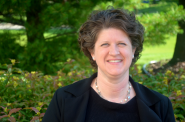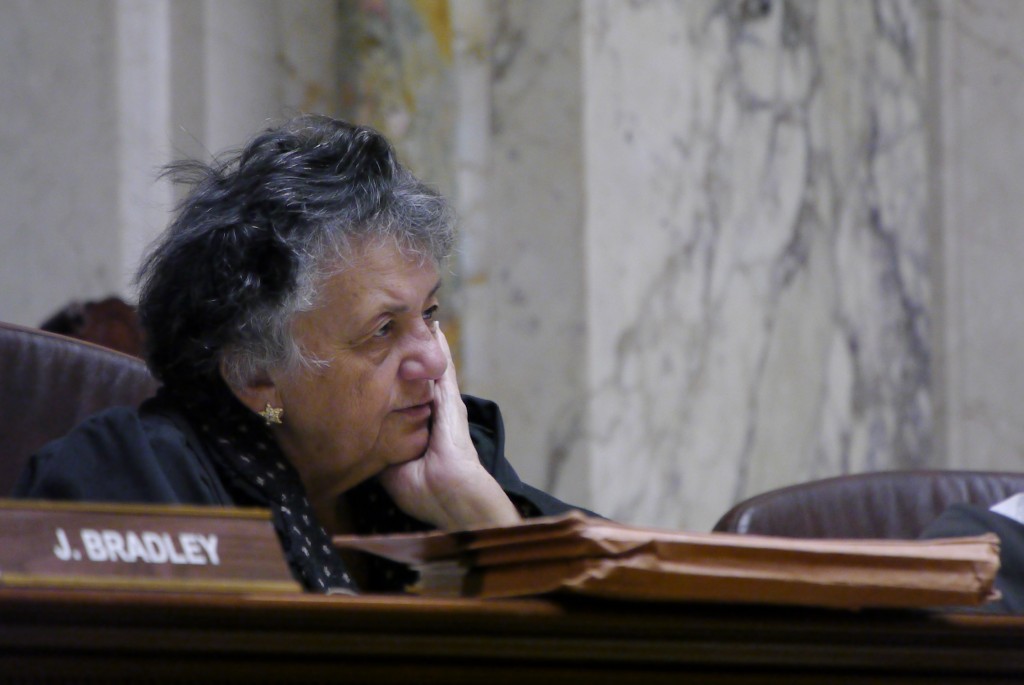Mum’s The Word For Justice Abrahamson
For 43 years she said nothing about Legislature’s “illegitimate” sessions. Until now.
Credit Shirley Abrahamson for knowing how to keep a secret.
We learned last week that Justice Abrahamson has watched quietly throughout her decades-long tenure as Wisconsin legislators acted, time and again in her opinion, outside the limits of the state’s constitution.
How else to understand her agreement with Justice Rebecca Dallet that:
The Legislature unconstitutionally met in an “extraordinary session” in December 2018 and…[i]n order to uphold the constitutionality of the December 2018 extraordinary session, the majority opinion subverts the plain text…of the Wisconsin Constitution.
By signing Justice Dallet’s dissenting opinion, but adding no comment of her own, Justice Abrahamson was spared the task of explaining the apparent illegitimacy — in her view — of extraordinary sessions held on many occasions during the last four decades of her tenure. (Justice Ann Walsh Bradley, first elected to the court in 1995, joined Justice Abrahamson in concurring — without comment — in Justice Dallet’s dissent.)
Former Democratic Assembly Speaker Tom Loftus recently wrote an op-ed in The Capital Times on the history and constitutional basis for extraordinary sessions. He said, in part:
[T]he legislature is always in session. The reality of one continuous two- year session was formally acknowledged by a constitutional amendment ratified in April 1968: “Shall Article IV, Section 11 of the Constitution be amended to permit the Legislature to meet in regular session oftener than once in two years?” The amendment was ratified in a 670,757 to 267,997 vote.
The Legislature, under the Constitution, governs itself — setting its own rules of organization, procedures and calendar. So an extraordinary session is simply a floor period added to the dates adopted at the beginning of the two-year session, but, like a special session, it is restricted in subject matter.
Extraordinary sessions came to be part of the Legislature’s way of doing business when I was Assembly speaker and Tommy Thompson was minority leader. The leaders call the session dates and the subject.
The legal staff of the nonpartisan Legislative Reference Bureau has addressed this issue on at least two occasions, once in the late 1990s and again earlier this year in a 24-page memorandum to Loftus. That report notes:
The first extraordinary session was held in January of 1980. In total, there have been 36 extraordinary sessions called. Nearly all of these sessions have been called by a majority of members in the committee on organization in each house, rather than by joint resolution.
The Loftus memo then lists the wide array of issues considered and voted on during those extraordinary session.
In contrast to a special session, which is called by the governor, an extraordinary session is initiated by the legislature. The legislature adopted a joint rule in 1977 permitting the call for an extraordinary session during a committee work period or after the expiration of the last scheduled floor period.
As Justice Abrahamson was on the bench at the time of the 1998 report, she and Justice Bradley most certainly were aware that the Legislature had convened numerous times in extraordinary session. Yet it was not until last week that they concurred in a dissent that effectively invalidated those sessions.
It strains credulity to think that either Justice Abrahamson or Bradley simply looked the other way as the Legislature repeatedly violated the Constitution. This leads to a more reasonable alternative explanation for their dissent last week. Namely, neither saw a problem until a high profile extraordinary session directly pitted a Republican Legislature against a newly elected Democratic Governor. Their concurrence with Justice Dallet’s dissent is a reminder of how Wisconsin’s high court has become, for the left, a venue for undoing lawful legislative action with which it disagrees.
As Justice Daniel Kelly seeks election to a full term next year, the long-term implications of Justice Dallet’s outcome-driven dissent are clear. Had Brian Hagedorn not prevailed, the left would be a single vote away from a Supreme Court willing to do its bidding.
The Contrarian
-
Parents May ‘Break Up’ MPS
 Feb 8th, 2022 by George Mitchell
Feb 8th, 2022 by George Mitchell
-
School Choice Key Issue in Governor Race
 Sep 1st, 2021 by George Mitchell
Sep 1st, 2021 by George Mitchell
-
Jill Underly Flunks School Choice 101
 Feb 22nd, 2021 by George Mitchell
Feb 22nd, 2021 by George Mitchell






















Consider the possibility that the 44th illegitimate session was the first obviously illegitimate session.
Unlike the radically activist right-wing judges that are so often over-reaching wildly to decide issues that have not even been raised by the parties in the cases before them, Justice Abrahamson simply has not ruled in the past on the legitimacy of “extraordinary” sessions of the Legislature because no one has raised a challenge to them before now. George Mitchell certainly knows better, and his posting is nothing other than an unfair shot at a justice who is properly known for her intelligence, hard work, and high ethics.
Perhaps Abrahamson never before ruled on the legitimacy of “extraordinary” legislative sessions because the issue was never raised before the court before. Appeals courts (a category that includes Wisconsin’s Supreme Court) are not kings; they only rule on arguments specifically brought before them by litigants.
If no prior litigant ever questioned the validity of “extraordinary” sessions, there would have been no reason for the judges to rule on the issue before.